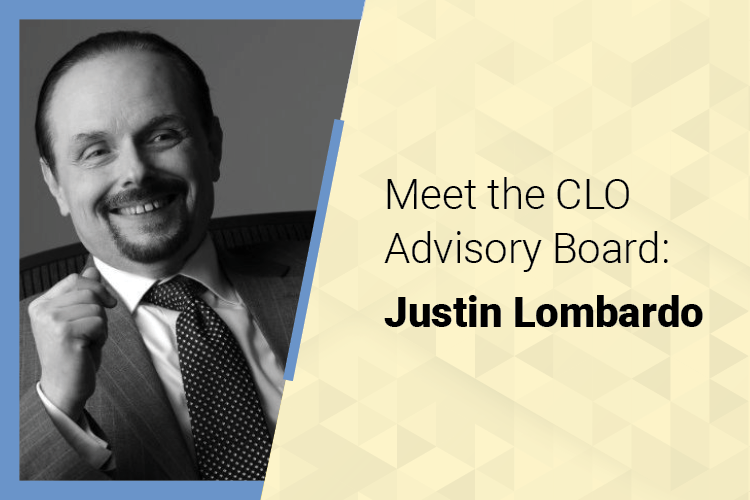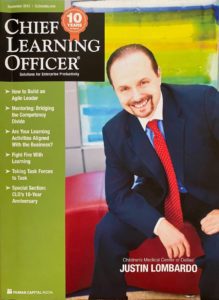
Meet longtime CLO Advisory Board member Justin Lombardo, chief human resources and staff development officer for the Archdiocese of Chicago.
by Elizabeth Loutfi-Hipchen
February 4, 2021
 In this Q&A, we get to know Justin Lombardo, the Archdiocese of Chicago’s chief human resources and staff development officer. Lombardo has held numerous roles in learning and development at the C-suite or executive level at Motorola University, Northwestern Memorial Hospital, Children’s Medical Center of Dallas and Baptist Health.
In this Q&A, we get to know Justin Lombardo, the Archdiocese of Chicago’s chief human resources and staff development officer. Lombardo has held numerous roles in learning and development at the C-suite or executive level at Motorola University, Northwestern Memorial Hospital, Children’s Medical Center of Dallas and Baptist Health.
Chief Learning Officer: Where is your hometown?
I grew up as a Chicago boy. Greater Chicago is my hometown and I still love it. I did move away for a while, lived in Minnesota for quite a while, and then did a stint in Texas and then a short stint in Florida, and then came back.
CLO: How did you become interested in L&D?
I started in higher education for a liberal arts college. I was associate dean of curriculum for two of them as they were trying to merge their curriculum, because they were cooperative colleges. And I began to look at and study curriculum models. One of the ones that came up was a competency model. Back in those days, competency modeling for true curricula was very uncommon, it was just being pioneered in some colleges. So that got me interested, which led me to look at — when I was ready to leave higher ed — issues of learning and development as competency-based, which led me to corporate. I was so lucky to be one of Bill Wiggenhorn’s first hires at Motorola University. When I talk to people for whom [L&D] was not their first career, they tend to be people who are very naturally inquisitive. That seems to be one of the characteristics. They begin studying something or examining something or tackling a business problem and it leads them here.
CLO: What lessons did you learn in 2020 that you’ve brought with you into 2021?
Lessons I carry over: Follow the DATA. Plan, replan and have three more back ups. And finally, we must always look out for the vulnerable whether economically, physically, socially because if we don’t, we are no different than plant life!
CLO: How have you seen the role of CLO change throughout your career in L&D?
When I first started in the field, which was back in the 80s, it was primarily still a role for functional tacticians. You did training and you had to make sure that all the training was out. But over the years, and especially with some of the early pioneers — like Wiggenhorn and others, and then the rest of us, the second generation — you began to see it really moving to the role of a strategic thinker. That meant you were moving out of a functional role as a tactician to a business leader, because you needed to become more strategic, you had to think strategically, you had to operate strategically. The final nuance of it was that you were a strategic thinker, but there was an expectation that you knew the discipline of L&D. For a time period, it was a rotational role for people who were moving into senior positions. Then it became important that the individual have a grounding in the discipline because it moves so quickly. Over the years, it really evolved from, I would say, a lower-level, functional tactician to really a strategic, disciplined business thinker.

CLO: How do you like to enjoy your time outside of work?
For the last 35 years, I’ve been a gym junkie. I’ll go to the gym four or five times a week. I found it relaxed me and kept me from wanting to bang my head against the wall and kept my friends from running away from me because it would calm me down. Also, believe it or not, I’ve been singing in choruses for about 30 years and loving it. Everything from choruses here in Chicago to Turtle Creek Chorale in Texas, to smaller choruses in church. That’s been a great deal of fun and very rewarding. It feeds that artistic side.
Now, both those things obviously in the age of COVID are gone. What I’ve picked up on again is the wimpy substitute of using my own treadmill and some resistance bands, which takes the place of the gym. Other than the shower, there is no substitute for singing. So the third thing I enjoy doing, and I have actually picked it up and done a lot more of it since COVID, is cooking. I’ve always enjoyed cooking and I’m pretty good at it. But when you can go out for dinner with friends, it’s easier just to pick up the phone. And especially in a city like Chicago, a big city, you get myriads of restaurants, so you just go out for dinner. Now, there’s no going out for dinner, so I’m back into the cooking thing. That’s how I enjoy my time.
CLO: What book, either audio or physical, or podcast has gotten you through 2020 and the pandemic?
Honestly, believe it or not, it’s the Book of Psalms. Because the Book of Psalms is something I can pick up any day of the week and read. And the Psalms, whether or not you are a believer, I happen to be one, but even if you’re not, the Psalms are great poetry and they have in the all 150 of them, you can find a Psalms that will match whatever mood or emotion or struggle or happiness that you’re experiencing. And certainly 2020 has been absolutely full of those peaks and valleys, the entire year. So I find the book of Psalms to be something I can turn to. It gives voice to things I may be feeling. I read some of it every day.
CLO: In your opinion, what are some components of a robust L&D program?
They have to be rigorous, which means they’re worthwhile. They’re focused, they make you really think through problems and issues to solve so that you can adapt them. They also have to be challenging. If you can knock through it without really paying much attention, it’s a wasted course. There are training programs that are the equivalent of “Basket Weaving 101.” We all joke about it, but there are training programs like that. I would hope that they’re also creative, and easy to use. If you have somebody that has to screw around figuring out four different clicks, or sit through 45 minutes of “Let’s go around the room and introduce ourselves” as part of a training program, that’s not user-friendly, that’s a waste of time.
CLO: What advice do you have for CLOs or learning leaders as they take on 2021?
You’ve got to be agile, more agile than you’ve ever been. You have to be more creative than you have ever been, because your resources are going to be shifting. You better have three contingency plans for everything you see on your horizon, because I will guarantee you, the first plan won’t work, that things will change. And I’ve learned that managing a large organization’s COVID task force, leading it, that you take a plan and five hours later, because we were learning as we were going along with the clinicians and the scientists, the plan blows up. So you better have three or four of them going, you better use every bit of creativity to think differently, and you have to be as agile as you possibly can be. You also have to be patient with everybody, because not everybody is good at trial and error. Not everybody is a risk taker, not everybody is agile. A real leader will look around at her team and say, “How do I pull the best out of these people?” Because in a crisis, it’s not about the physical resources. It’s not about the money, it’s not about the tablets. It’s about getting the team to think differently so they can solve all the issues in a way that’s never been done.
This article has been edited for brevity.




